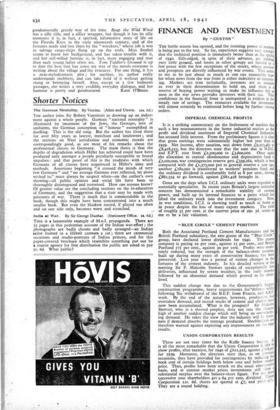FINANCE AND INVESTMENT
By CUSTOS "
Tam battle season has opened, and the resisting power of markets is being put to the test. So far, experience suggests very strongly that the technical poSition is immensely better than m the spring of 1940. Gilt-edged, in spite of their advance, are yielding . very little grOand, and losses in other groups are limited to a few pence with the few exceptions of the stocks, whose position and prospects are directly influenced by war events. This seems to me to be just about as much as one can reasonably hope for when news from the war front is either indecisive or threaten- ing. Markets are trim technically, investors are as resolute as ever in their determination to hold on, and there is a reserve of buying power waiting to make its influence felt as soon as the war news provides investors with their cue. That confidence in the financial front is unimpaired is evident in the steady rate of savings. The resources available for investment will almost certainly be reinforced before long by further vesting orders.
IMPERIAL CHEMICAL PROFITS
It is a striking commentary on the listlessness of markets that such a key announcement in the home industrial section as the profit and dividend statement of Imperial Chemical Industries has aroused little interest. From the preliminary figures it is clear that gross earnings were subitantially higher -last year than in 1939. Net income, after taxation, was down from £9,313,485 to £8,418,533, but, the directors state that the sum due in N.D.C. and E.P.T. rosé froth -£2,5oo,009 to L5,600,000. Once again the allocation to central obsolescence and depreciation fund is £2,000,000, war contingencies reserve gets £339,262, which is best compared with the L1,315,000 put to general reserve a year ago, another £180,092 is transferred to workers' pensions fund, and the ordinary dividend is comfortably held at 8 per cent., leaving £882,354 to go forward, against £681,428 brought in.
Gone are the days when I.C.I. ordinary units were regarded as essentially speculatsve. In recent years Britain's largest industrial concern has demonstrated a remarkable stability of earning power, and built up its internal finances to a point which has lifted the ordinary stock into the investment category. Now, in war conditions, I.C.I. is showing itself as much at home as in peace despite the loss of many export markets. The yield of roughly 5+ per cent. at the current price of 29s. 3d. seems to me to be a fair valsiation.
" BLUE CIRCLE " CEMENT POSITION Both the Associated Portland Cement Manufacturers and the British Portland subsidiary, the two giants of the " Blue Circle" group, have declared lower dividends for 1940. The parent company is paying to per cent., against 15 per cent., and British Portland 171. per'cent., against 20 per cent. Profits were mode- rately reduced, but the strength of the balance-sheet position, built up during many years of conservative finance, has been preserved. Last year was a period of violent changes in the fortunes of the cement industry. In his detailed review at the meeting Sir P. Malcolm Stewart speaks, of exceptionally low deliveries, influenced by severe weather, in the early months followed by an abnormal demand which proved to be short- lived.
This sudden change was due to the Government's factory construction programme, heavy requirements for defence works following the withdrawal of the B.E.F. from France, and A.R.P. work. By the end of the autumn, however, production had overtaken demand, and record stocks of cement and clinker have now been accumulated. What is the prospect? Sir Malcolm Stewart, who is a shrewd prophet, does not rate the chances high of another sudden change which will bring an overwhelm- ing demand. He takes the view that the industry will be fortu- nate if demand absorbs the tonnage produced. Stockholders are therefore warned against expecting any improvement on the 194° results.
UNION CORPORATION RESULTS
These are not easy times for the Kaffir finance houses. is all the more remarkable that the Union Corporation is able t° show profits, after taxation, for 04o of £612,512, again,st I:618'29 for' 1939. Moreover, the directors state that, as on previous occasions, they have provided for contingencies by reducing rhe
.
book cost of certain holdings both below cost and below mark.' price. Thus, profits have been struck on the usual conservahve basis, and at current market prices investments still show. a substantial surplus over the balance-sheet figure. - For the r11.114 successive year shareholders get a 64 per cent. dividend. Union Corporation 12s. 6d. shares are quoted at L7, and yield 51c,b. They are a sound holding.


























 Previous page
Previous page